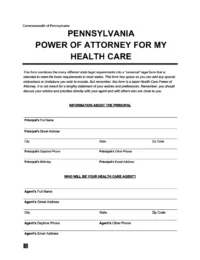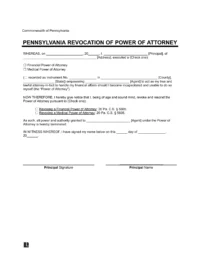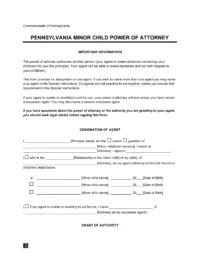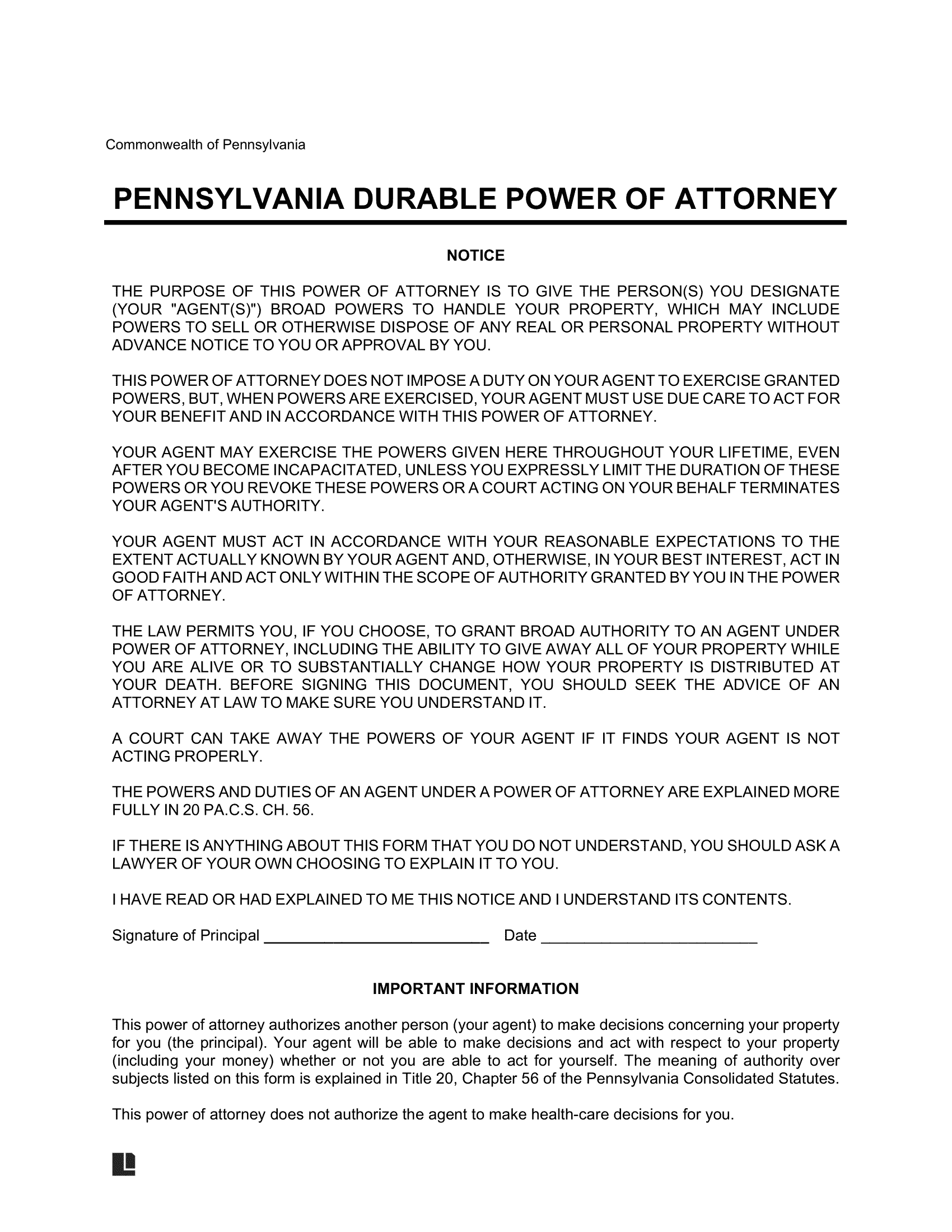A Pennsylvania durable power of attorney form allows one person to delegate financial responsibilities to another person, giving the designated agent the power to manage tasks such as bill payments and real estate transactions. Choosing a trustworthy agent for this arrangement is vital as durable powers of attorney persist until the principal’s death.
Laws
In Pennsylvania, power of attorney forms are durable by default.
- Relevant Laws: §§ 5601 — 5614 (Powers of Attorney).
- Presumed Durable: Yes. § 5601.1.
- Signing: The signature of the principal and two witnesses are required. § 5601(b)(3).
- Notarization: Signatures must be completed in front of and acknowledged by a notary public or other authorized official. §§ 5601(c), 5601(d), 5601.1.
- Statutory Form: No, just drafting language suggestions. § 5602.
Definitions
Durable – “A durable power of attorney is a power of attorney by which a principal designates another his agent in writing. The authority conferred shall be exercisable notwithstanding the principal’s subsequent disability or incapacity. A principal may provide in the power of attorney that the power shall become effective at a specified future time or upon the occurrence of a specified contingency, including the disability or incapacity of the principal” (§ 5604(a)).
Power of Attorney – “The Pennsylvania statutes do not define “power of attorney” but do provide a list of abilities that an agent is presumed to have and those that an agent is granted only if specifically granted in the document” (§ 5601.4).
Specific Powers and Limitations
Restrictions on Gifts and Transfers
You can find the restrictions on types of gifts and the considerations an agent must make in § 5601.4:
Types of Gifts:
- Outright gifts: A gift can go directly to someone, and the agent can give as much as the law allows without paying extra taxes on gifts each year. If the principal who owns the property is married, and their spouse agrees, the agent can contribute double that amount.
- For the benefit of another person: A gift for another person’s benefit may include a special savings account for children, like the ones mentioned in the Uniform Transfers to Minors Act. It may also include money the agent puts into a 529 plan for a child’s future education.
- Gift splitting: The agent may agree to share the responsibilities for a gift that the principal’s spouse has given, allowing the agent (on behalf of the principal) and the principal’s spouse to give more together without paying extra taxes.
Considerations: An appropriate gift is one that aligns with the principal’s known desires or benefits them directly or indirectly. The principal’s estate plan, tax planning strategies, and the potential impact on Medicaid eligibility are critical considerations.
Agent’s Authority Limitations:
The scope of an agent’s authority in Pennsylvania is determined by the terms of the Durable Power of Attorney document. Common limitations include:
- The agent cannot make changes to the principal’s will.
- The agent is restricted from voting in public elections on behalf of the principal.
- Making health care decisions is typically beyond the scope of a DPA and requires a separate Health Care Power of Attorney under Pennsylvania law.
If an agent is not a family member (like a parent, spouse, or child) of the person giving them power (the principal), they cannot use this power to give themselves or someone they have to take care of legally, any part of the principal’s property. This includes making gifts, having rights to the property after the principal’s death, naming themselves as beneficiaries, or rejecting parts of the property in any way (§ 5601.4 (b)).
Revocation and Termination
A Durable Power of Attorney can be revoked at any time by the principal as long as they are competent. As per § 5605, the revocation must be in writing and communicated to the agent and any third parties relying on the DPA. Additionally, the DPA automatically terminates when:
- The principal dies.
- The principal becomes incapacitated, and the DPA is not durable unless specified otherwise.
- The specific term mentioned in the DPA expires.
- In case of divorce or annulment, if the agent is the principal’s spouse, unless stated otherwise in the document.
Safekeeping and Registration
Pennsylvania does not have a state-wide registry for Durable Powers of Attorney. It is recommended that the original document be kept in a secure yet accessible location. Copies should be provided to the agent, relevant family members, and possibly financial institutions or healthcare providers as needed.
Additional Resources:
- State Bar Association: For comprehensive guides, forms, and legal resources related to Durable Powers of Attorney.
- Pennsylvania Law Help: Various organizations offer legal aid or pro bono services for those needing assistance.
Related Forms
Medical Power of Attorney
Signing Requirements: Two witnesses (§ 5452 ).
Revocation of Power of Attorney
Signing Requirements: Notary Public recommended.
Minor (Child) Power of Attorney
Signing Requirements: Two witnesses and notary public.



